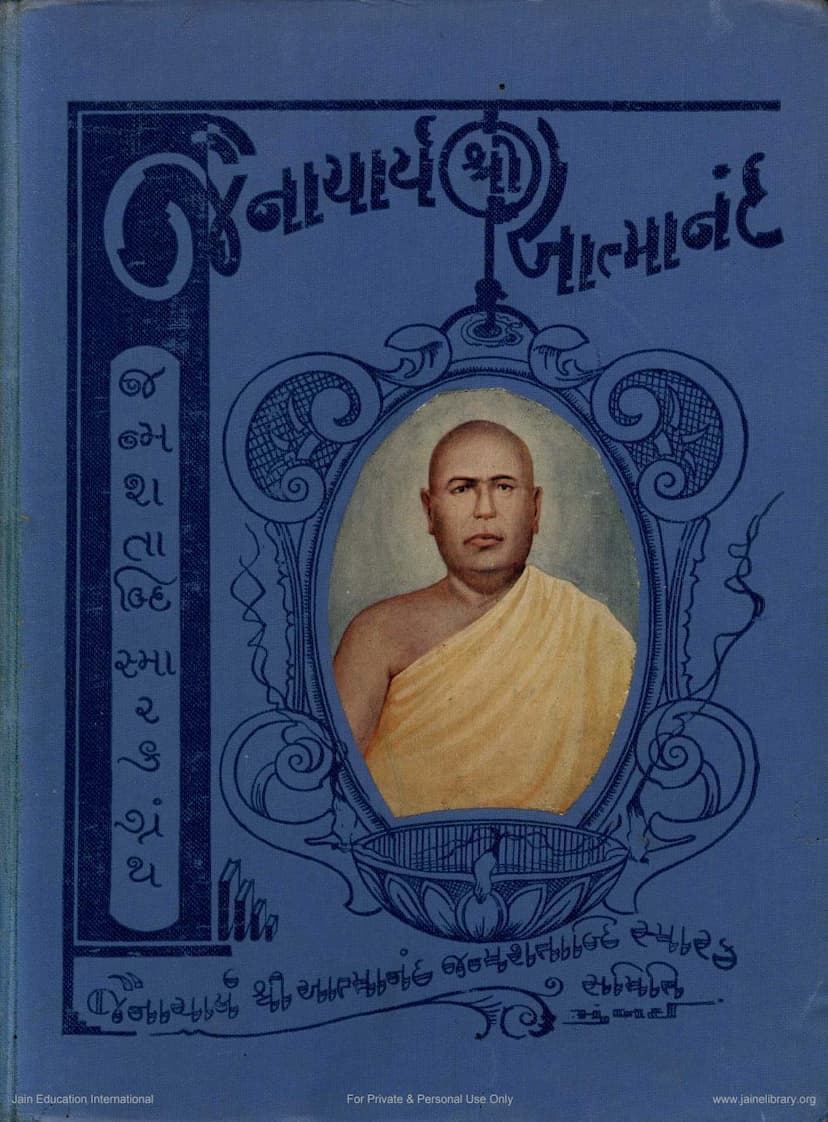Atmanandji Jainacharya Janmashatabdi Smarakgranth
Added to library: September 1, 2025

Summary
This is a comprehensive summary of the Jain text "Atmanandji Jainacharya Janmashatabdi Smarakgranth," compiled by Mohanlal Dalichand Desai and published by the Atmanand Janma Shatabdi Smarak Trust in 1936. The book commemorates the birth centenary of Jain Acharya Shri Atmaramji, also known as Shrimad Vijayanand Surishwarji.
Overview:
The "Atmanand Janmashatabdi Smarakgranth" is a commemorative volume dedicated to the life and teachings of Acharya Shri Atmaramji Maharaj (Shrimad Vijayanand Surishwarji). It was published in 1936 to mark the centenary of his birth, at the initiative of Acharya Shri Vijaya-Vallabh Suri. The book is a collection of essays, poems, and historical accounts written by various scholars and admirers in Sanskrit, Prakrit, English, Hindi, and Gujarati.
Key Figures and Themes:
-
Acharya Shri Atmaramji Maharaj (Shrimad Vijayanand Surishwarji): The central figure of the commemoration. He is praised as a spiritual leader, reformer, scholar, author, and influential figure in the Jain community during the 19th century. His life and mission are presented as an inspiration for his followers. He is credited with:
- Restoring ancient Jain ideals of worship, particularly promoting "Murti Puja" (idol worship).
- Reforming the Jain monastic order (sadhus) and encouraging them to acquire knowledge.
- Preserving and distributing Jain sacred literature, which was often neglected or in danger of being lost.
- Promoting social reforms, advocating against child marriage, polygamy, and advocating for simple, less expensive social customs, including inter-dining and inter-caste marriages.
- Establishing educational centers (pathshalas, libraries) for both males and females.
- Being a prolific author in Hindi, with significant works like "Jaina Tatwadarsha," "Tatwanirnaya Prasad," "Agnantimir-Bhasker," and "Chicago-Prashnottar."
- Spreading Jainism beyond India, notably through his representative, Virchand Raghavji Gandhi, at the World's Parliament of Religions in Chicago (1893).
- His teachings emphasized deep reverence for life, the value of the human soul, and universal love, regardless of differences.
-
Virchand Raghavji Gandhi: A prominent disciple of Acharya Shri Atmaramji, who represented Jainism at the World's Parliament of Religions in Chicago. The book includes opinions from American papers about his eloquence and knowledge, and his efforts to spread Jainism in the West. His lectures on Jainism and related topics were well-received.
-
Scholarly Contributions: The book features a wide range of articles by distinguished scholars, covering various aspects of Jainism and its influence:
- Jain Philosophy and Mysticism: Discussions on concepts like "Syadvada," "Anekantavada," "Jain Mysticism," and the nature of the soul.
- Jainism and Social Reform: Articles addressing the importance of education, the role of women, and the need for unity within the Jain community.
- Jainism in South India: Historical accounts of the spread and influence of Jainism in Tamil Nadu and Mysore.
- Jaina Iconography: A study of the representations of deities, Tirthankaras, Yaksas, Yaksinis, and other figures in Jain art.
- Jain Literature and Language: Discussions on the contributions of Jain scholars to Sanskrit, Prakrit, Gujarati, and Hindi literature, including the importance of preserving ancient manuscripts and the influence of Jain scholars on the development of Gujarati language.
- Comparative Religion: Articles touching upon Jainism in relation to other religions, its universal appeal, and its principles of Ahimsa (non-violence).
- Historical Accounts: Reminiscences of personal encounters with Acharya Shri Atmaramji, historical events related to Jainism, and the role of the Jain community in shaping Indian history and culture.
-
Commemoration and Organization: The book was published by the "Jainacharya Shri Atmanand Janma-Shatabdi Smarak Samiti," formed at the initiative of Acharya Shri Vijaya-Vallabh Suri. The publication process involved efforts to gather articles from various scholars, printing at Shri Mahodaya Printing Press in Bhavnagar, and distribution by Maganlal Mulchand Shah. The centenary celebrations were held in Baroda in March 1936, with significant public participation and financial support.
Key Aspects Highlighted:
- Emphasis on Education: The book repeatedly stresses the importance of education for the upliftment of the Jain community and the preservation of Jain heritage. The establishment of schools and libraries in the name of Acharya Shri Atmaramji is a recurring theme.
- Reformist Zeal: Acharya Shri Atmaramji is portrayed as a dynamic reformer who challenged existing norms and practices within the Jain community when he felt they deviated from core principles or hindered progress.
- Interfaith Dialogue: The book implicitly acknowledges the broader religious context of the time, especially through the inclusion of discussions on the Parliament of Religions and comparisons with other faiths.
- Legacy and Inspiration: The volume serves as a testament to the enduring legacy of Acharya Shri Atmaramji, inspiring subsequent generations to follow his teachings and continue his work for the welfare of Jainism and humanity.
In essence, the "Atmanandandji Jainacharya Janmashatabdi Smarakgranth" is a comprehensive tribute to a significant Jain spiritual and intellectual leader, showcasing his multifaceted contributions and the collective reverence of the Jain community towards his memory. It highlights his role as a reformer, scholar, and promoter of Jain ideals, with a particular focus on the enduring impact of his efforts on education, literature, and spiritual revival.